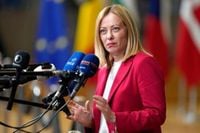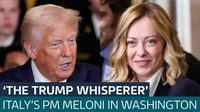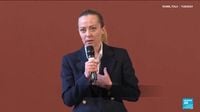Italian Prime Minister Giorgia Meloni is set to meet with U.S. President Donald Trump on Thursday, April 17, 2025, in a pivotal discussion that aims to address the ongoing trade tensions between the United States and the European Union. This meeting marks Meloni as the first European leader to engage with Trump face-to-face since he announced a 20% tariff on EU exports, which was later suspended for 90 days. Meloni’s visit comes at a critical juncture, as she seeks to position herself as a mediator between the EU and the U.S., while defending Europe’s trade interests.
Meloni, who arrived in Washington on the evening of April 16, has been described by Trump as a "fantastic leader," sharing many of his conservative views. However, she has also criticized the tariffs as "wrong," advocating for a balanced approach to trade that would benefit both sides. During her visit, Meloni plans to propose a reciprocal elimination of most industrial tariffs between the U.S. and the EU, effectively creating a free-trade zone that could bolster economic ties.
Italy enjoys a significant trade surplus with the United States, amounting to approximately 40 billion euros ($45.4 billion) last year, making the stakes of this meeting particularly high for Meloni. Italy is the world's fourth-largest exporter, with around 10% of its exports directed to the U.S. sectors crucial to the Italian economy, including luxury goods like fashion and food products, which have gained popularity among American consumers.
As Meloni prepares for her talks, she faces the challenge of balancing her ideological alignment with Trump against the backdrop of her responsibilities to the EU. Critics have expressed concerns that her bilateral discussions could undermine the unity of the bloc. "If we start having bilateral discussions, obviously it will break the current dynamic," warned France's industry minister, Marc Ferracci. Nevertheless, a European Commission spokeswoman noted that Meloni's outreach was "very welcome," emphasizing the importance of dialogue.
Meloni’s meeting with Trump is not only about tariffs; it will also likely touch upon NATO defense spending. Trump has been vocal about his demands for NATO allies to increase their military spending from 2% to 5% of GDP, a significant ask for Italy, which currently spends around 1.5%. This topic adds another layer of complexity to Meloni's diplomatic mission.
In the lead-up to her meeting, Meloni has emphasized the need for calm and dialogue, urging Brussels to avoid a retaliatory stance against U.S. tariffs. "We absolutely must avoid a tariff war," said Italy's Industry Minister Adolfo Urso, who highlighted Meloni's objective to convince all parties of the necessity to engage in discussions. Meloni has been in close contact with EU Commission President Ursula von der Leyen, ensuring that her visit is aligned with broader EU interests.
Despite the potential risks of her meeting, Meloni has remained optimistic. "We know we're going through a difficult period, let's see how it goes in the coming hours," she remarked at an awards ceremony in Rome. This visit is significant not only for the immediate economic implications but also for Meloni's political standing both at home and abroad.
Meloni's approach reflects a careful navigation of her dual roles as a national leader and a representative of the EU. While she has been a vocal supporter of Ukraine amidst the ongoing conflict with Russia, she must also manage her relationship with Trump, whose unpredictable nature has strained transatlantic relations. Meloni's ability to charm and negotiate with Trump could have lasting implications for Italy and the EU as a whole.
As the meeting approaches, analysts caution against raising expectations too high. "The best strategy has been to be very circumspect: Get there, get the meeting, get the photo opportunity," advised Wolfango Piccoli, an analyst at Teneo consultancy. If Meloni can return to Italy with insights on how Washington intends to frame future relations regarding trade, defense, and Ukraine policy, it would be considered a significant achievement.
In conclusion, Meloni’s visit to Washington represents a critical moment for both her leadership and the future of EU-U.S. relations. As she steps into the Oval Office, the world will be watching closely to see how she balances the interests of her nation with those of the European Union, and whether she can successfully advocate for a more favorable trade relationship with the United States.








